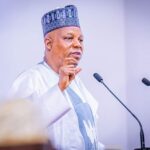Unemployment is not just an economic problem in Nigeria, it has become a national security threat. The increasing levels of joblessness, particularly among the youth, have created a fertile ground for social unrest, banditry, kidnapping, and other forms of criminality.
The staggering statistic from the World Bank that 129 million Nigerians live below the poverty line out of a population of 220 million to 230 million paints a dire picture of the state of Nigeria’s workforce and its broader social fabric.
Unemployment in Nigeria has grown steadily over the past decade, exacerbated by poor economic policies, corruption, and a global economic slowdown. Youth unemployment, in particular, is alarming.
This systemic poverty, driven by high unemployment, leaves many young Nigerians disillusioned and desperate. With little hope for improvement, some of them resort to crime as a means of survival. This has contributed to an increase in insecurity across the country.
- Don’t allow languages, culture go extinct, parents urged
- Kano CJ releases 37 inmates on medical grounds
The connection between unemployment and insecurity is clear, when young people are unable to find jobs or provide for themselves, they become vulnerable to exploitation by criminal networks. In regions where unemployment is particularly high, such as the northern and northeastern parts of Nigeria, extremist groups like Boko Haram and other insurgent organisations have been able to recruit disenfranchised youth with promises of financial reward and a sense of purpose.
Kidnapping for ransom has grown into a thriving criminal enterprise, with abductors targeting individuals, families, and even entire school populations to extract large sums of money. The prevalence of this crime highlights how deeply ingrained the unemployment crisis has become.
The federal government’s failure to address unemployment at its root contributes to this escalating crisis.
To combat unemployment and its associated security risks, Nigeria needs a comprehensive human capital development strategy. Human capital development that focuses on improving the skills, education, and overall well-being of the population, enabling individuals to contribute more productively to the economy. For a country like Nigeria, with a vast pool of untapped human potential, investing in education and job creation is key.
A strong human capital development framework would ensure that young Nigerians are equipped with the skills necessary to thrive in the modern economy.
The federal government should prioritise addressing unemployment as a matter of national security. Job creation should be at the centre of government policy, alongside efforts to improve infrastructure, promote entrepreneurship, and attract foreign investment. Special attention should be given to sectors with high growth potential, such as agriculture, technology, and manufacturing.
Public-private partnerships could play a crucial role in this regard. By encouraging investments in these sectors, the government can create jobs and provide opportunities for young Nigerians to develop skills that align with global industry demands. Furthermore, targeted social welfare programmes are essential to support those living below the poverty line while providing opportunities for upward mobility.
The government also needs to implement reforms that encourage the formalisation of Nigeria’s informal economy, which accounts for a significant portion of employment but lacks stability and security. Formalising these jobs would help create sustainable employment opportunities and lift more Nigerians out of poverty.
Muhammad Tukur Mua’zu wrote from Yola, Adamawa State
 Join Daily Trust WhatsApp Community For Quick Access To News and Happenings Around You.
Join Daily Trust WhatsApp Community For Quick Access To News and Happenings Around You.


